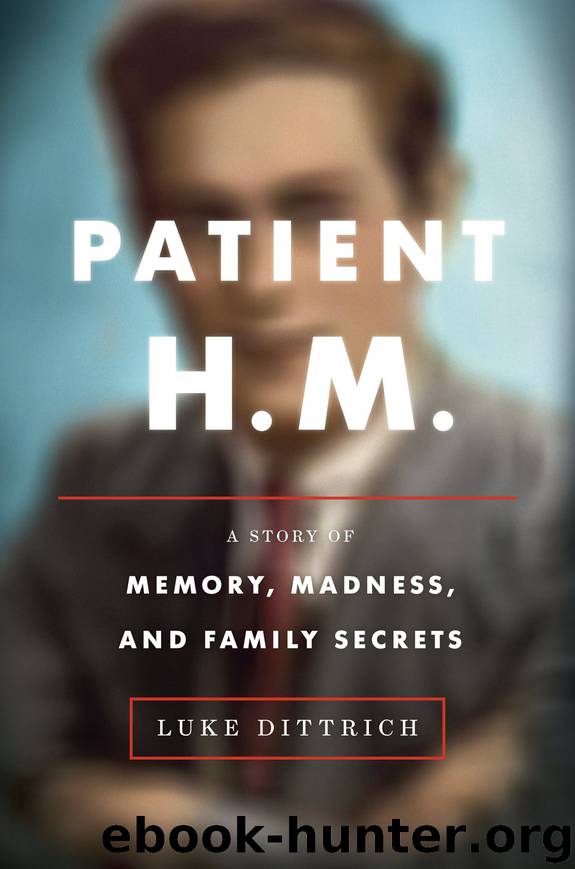Patient H.M. by Luke Dittrich

Author:Luke Dittrich
Language: eng
Format: epub
Publisher: Random House Publishing Group
Published: 2016-08-08T16:00:00+00:00
PART IV
DISCOVERY
TWENTY
WHERE ANGELS FEAR TO TREAD
“It’s terrible how things accrue.”
Those are the first words in the transcript of my first interview with Brenda Milner. When I read the transcript, I hear her voice, a crisp British accent, words tightly spaced, while a hazy picture of her office forms in my mind. That’s what she was referring to: her office, and the clutter in it, how it had accrued over the years. The stacks of papers, the overstuffed bookshelves, the boxes full of files. It was one of those offices where it must be a struggle each morning to clear space for the new day’s work. There were posters on the walls, and I think one of them had an animal on it, a National Geographic–style nature photo, though I can’t remember what type of animal it was. There was one framed photograph on her desk, near her computer: a headshot of my grandfather in his light green surgical scrubs.
Our interview took place in 2010, and by that time things had been accruing in Milner’s office for more than a half century. She was ninety-three years old, still a full professor at McGill, still teaching classes, still doing research, still living the messy, striving life of an active scientist.
Milner greeted me warmly. Somebody from McGill public relations accompanied me to her office, and before the interview began a photographer arrived and led us to another room, to take a quick shot of the two of us for a Montreal Neurological Institute newsletter. “Does he look like Scoville?” somebody asked Milner. She appraised me—I’m taller than my grandfather, with a bigger nose, closer-set eyes, and a lot less hair.
“No,” she said, “not really.”
I’d arrived in Montreal the night before and was disappointed to hear that I’d just missed a screening of the movie Memento that Milner had hosted for the McGill Film Society. Memento’s protagonist, an amnesic man attempting to solve a murder mystery, was inspired in part by Henry. I told Milner I liked the film, and she said she did, too, that in general it was one of the most realistic cinematic portrayals of amnesia she’d ever seen, even though, she pointed out, the script had bungled the definition of short-term memory. People like Henry and the man in Memento don’t have bad short-term memory, she said. On the contrary, short-term memory is all they have.
I remember Milner sitting there by her cluttered desk, a tiny woman in a woolen skirt.
“Now,” she said, “how can I help you?”
—
Until coming to the Neuro in 1950, Milner had not had a major interest in memory. She was deeply curious about the brain, of course, and all the mysterious ways its structure correlated with its functions. And she understood how lesion patients had contributed to our understanding of those functions: During her final examination in psychology at Cambridge University, as she sat in the historic Senate House, one of the questions asked for a summary of the current knowledge about the localization of function for sight and hearing and speech.
Download
This site does not store any files on its server. We only index and link to content provided by other sites. Please contact the content providers to delete copyright contents if any and email us, we'll remove relevant links or contents immediately.
Hit Refresh by Satya Nadella(9115)
When Breath Becomes Air by Paul Kalanithi(8414)
The Girl Without a Voice by Casey Watson(7877)
A Court of Wings and Ruin by Sarah J. Maas(7798)
Do No Harm Stories of Life, Death and Brain Surgery by Henry Marsh(6929)
Shoe Dog by Phil Knight(5252)
The Rules Do Not Apply by Ariel Levy(4946)
A Higher Loyalty: Truth, Lies, and Leadership by James Comey(4942)
Hunger by Roxane Gay(4919)
Tuesdays with Morrie by Mitch Albom(4762)
Everything Happens for a Reason by Kate Bowler(4726)
The Immortal Life of Henrietta Lacks by Rebecca Skloot(4569)
Millionaire: The Philanderer, Gambler, and Duelist Who Invented Modern Finance by Janet Gleeson(4455)
How to Change Your Mind by Michael Pollan(4343)
All Creatures Great and Small by James Herriot(4301)
The Money Culture by Michael Lewis(4182)
Man and His Symbols by Carl Gustav Jung(4118)
Elon Musk by Ashlee Vance(4115)
Tokyo Vice: An American Reporter on the Police Beat in Japan by Jake Adelstein(3971)
